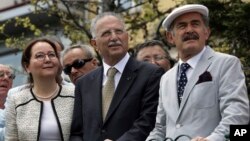Ekmeleddin Mehmet Ihsanoglu is not a natural politician, but rather an academic and diplomat who has headed the Organization of Islamic Cooperation for the past nine years. The country's two biggest opposition parties back him to challenge Prime Minister Recep Tayyip Erdogan's presidential bid, but he is facing an uphill struggle to convince voters, including some of his own supporters.
"Ekmeleddin, for bread," is his campaign slogan, playing in Turkish on the similarity between the Turkish word for bread - "Ekmek" - and the candidate's first name.
In launching his campaign, the soft-spoken 70-year-old stressed that his candidacy was about bridging social and religious divisions within Turkish society.
Ihsanoglu said that, as president, he would not allow either a conservative Muslim woman wearing a headscarf or an anti-government demonstrator who participated in last year's nationwide protests to be insulted or have their rights denied.
Turkey has been wracked by tensions between the pro-secular and conservative religious sectors of society. A distinguished academic who speaks three foreign languages, Ihsanoglu is presenting himself as a bridge between the communities.
Born in Cairo to a Turkish Muslim theologian, he is both a practicing Muslim and a professor of theology. Analysts said his message of conciliation was aimed at the front-runner in the presidential race, Prime Minister Recep Tayyip Erdogan.
Analyst Sinan Ülgen of the Carnegie Europe Institute in Brussels said the two men had very different visions of the presidency.
"They will compete with a different vision of how they want to run the country, with Erdogan making it clear he will want to continue to be part of the decision-making. Whereas Ihsanoglu will stand for a less intrusive presidency much more line with the current presidency. But it's also true that Ekmeleddin Ihsanoglu is also at a disadvantage, given that he has low name recognition in the country overall," said Ülgen.
Like fellow candidate Selahattin Demirtas, Ihsanoglu has limited resources compared to the prime minister's well-funded campaign.
This puts Ihsanoglu at a distinct disadvantage, observers say. With state and private media sympathetic to the prime minister, it is limiting Ihsanoglu's ability to reach out to Erdogan's conservative Sunni voters,. who may be more inclined to vote for him because of his religious background.
Analyst Ülgen said Ihsanoglu was also meeting resistance from some supporters of the center-left and pro-secular Republican People's Party, or CHP, which is backing his candidacy.
"Slowly, gradually, Ekmeleddin Ihsanoglu is getting to be known. So some of the reservations of the more hard-core secularists and Kemalists within the CHP camp ... could disappear. But nonetheless, it will really depend on the turnout rate. If the turnout rate falls below 80-85 percent, which will essentially mean that at least some of the CHP backers did not go out and vote, then Erdogan stands a chance of winning in the first round," he said.
Some Erdogan aides are already predicting he will easily secure the 50 percent plus one vote needed to win in the first round of voting on August 10. Despite such predictions, Erdogan has intensified his attacks on Ihsanoglu. Observers say the intensification of the prime minister's rhetoric suggest he sees Ihsanoglu as a real threat.




